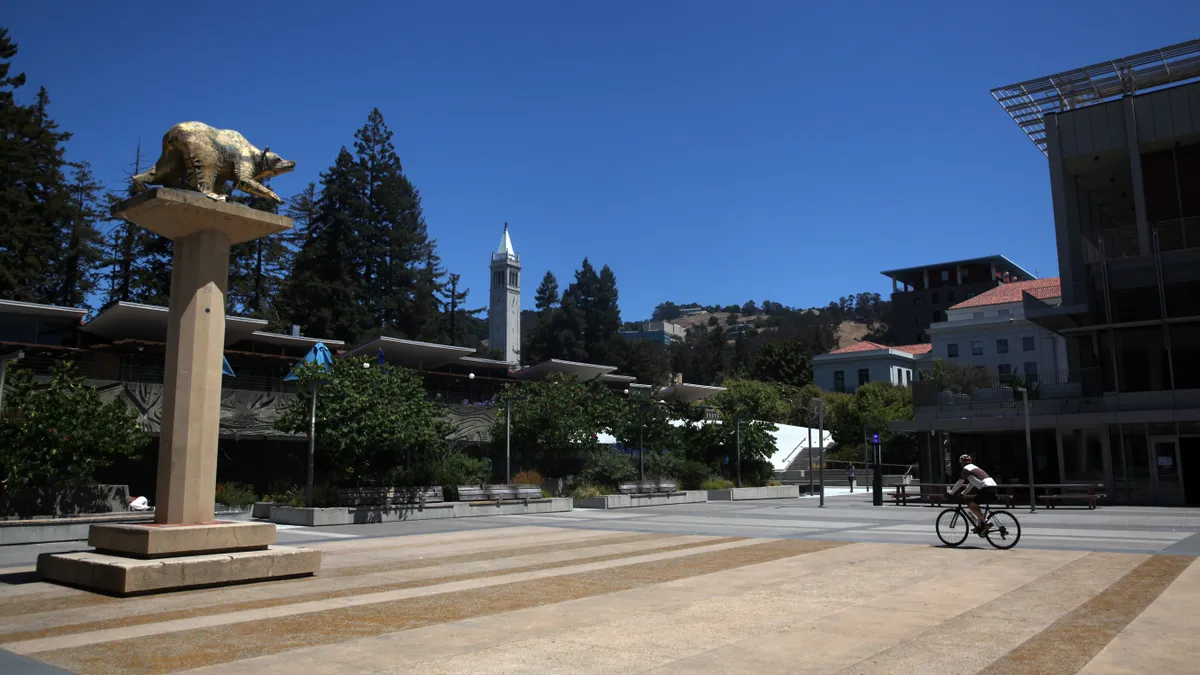Dive Brief:
- The University of California, Berkeley, anticipates cutting in-person fall enrollment by 2,629 students after a state Supreme Court decision, it said Friday — revising the figure down from an estimate of 3,050 given before justices ruled.
- Most of the reduction is expected to come from students who won't study on campus in the fall yet will nonetheless enroll at UC Berkeley, either online or later in the year than normal. But the university will not enroll over 400 new students who otherwise would have accepted admission. Those students are expected to mostly be graduate students.
- UC Berkeley is also pushing state lawmakers to take action to reverse the effects of the court decision, which forces the university to drop its enrollment back to 2020-21 levels using blunt instruments on a tight timeframe. The campus will expand its waitlist so it can ramp up enrollment quickly in case of quick legislative action, although it's publicly pointing out that most U.S. students in competitive admissions pick a college by May 1.
Dive Insight:
UC Berkeley is moving to cut its fall enrollment in response to a decision the Supreme Court of California issued Thursday. The decision kept in place an order from Alameda County Superior Court Judge Brad Seligman last year that froze UC Berkeley's enrollment at 2020-21 levels until the university assesses ways increasing its student body would affect the surrounding community.
University leaders have argued the order is particularly extreme because the pandemic depressed 2020-21 enrollment levels. Enrollment dropped that year as many graduate and undergraduate students decided to suspend their attendance, the officials said.
In fall 2019, UC Berkeley enrolled 43,185 undergraduate and graduate students, according to University of California data. That fell to 42,327 in 2020 before rising to 45,036 in the most recent fall.
UC Berkeley already sent out some undergraduate admissions offers in February. It's slated to make remaining offers to first-year students March 24, followed by offers to transfer students April 2. As a result, the university is scrambling to compensate for multiple years of admissions decisions on the fly.
Who won't be on campus this fall who otherwise might have? The university detailed the following plans Friday, which it said are approximate and subject to change as administrators find ways to enroll more students:
- Over 1,000 incoming first-year students will enroll in an all-remote first semester. Those students will then start in-person studies in January 2023, taking the place of students who graduate after the fall 2022 semester.
- About 650 students, mostly transfers, will enroll in January 2023 instead of fall 2022. They also will be taking the place of fall graduates.
- About 200 continuing students will study in off-campus programs or will be encouraged to complete their studies to open up in-person slots for new students. Off-campus programs include Cal in the Capitol in Sacramento and the UC Washington Center, or UCDC, in Washington, D.C.
- Over 400 new students who would have enrolled will not be enrolling at UC Berkeley. They are mostly graduate students.
Counting first-year undergraduates and new transfer students, UC Berkeley is aiming for its fall 2022 enrolling class to be 91% California residents — 6,334 resident students and 641 nonresidents. Student residency breakdowns are a sensitive topic for competitive public colleges in California after they faced blistering criticism for the number of high-paying out-of-state-students enrolled in the past.
"While these strategies will enable UC Berkeley to make available as many enrollment seats as we can, the lower court order leaves us with options that are far from ideal," Chancellor Carol Christ and Provost Catherine Koshland said in a Thursday statement.
The group that brought the lawsuit, Save Berkeley's Neighborhoods, would like a settlement. It wants UC Berkeley to commit to increasing student housing before the university boosts enrollment.
"We'd like to assure deserving California high school students that we are as disappointed as they are that UC has tried to use them as pawns in UC's attempts to avoid mitigating the impacts from the massive enrollment increases over the past few years," the group said in a statement. "By creating a tremendous housing shortage in Berkeley, the Regents have made it impossible for many students, particularly students from lower income families, to attend Berkeley."
A UC Berkeley spokesperson said the university has worked to increase housing and that the neighborhoods group has in the past demanded enrollment caps.














